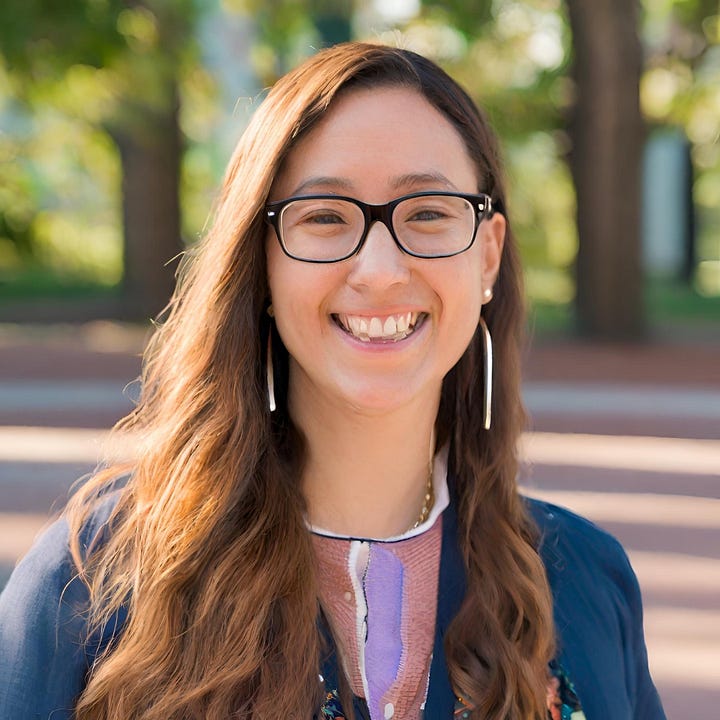I enjoyed my conversation with Fawzi Abou-Chahine very much and found myself nodding along with many of his points. He returned more than once to an essential difference between the totalizing view that many academics bring to their work and the healthier mindset that “you are more than just a chemist,…you are more than just the researcher, you have a different identity.”
Near the end of our chat, Fawzi extended this view to the job search itself, where the confident professional accepts mistakes as part of the process, whereas the anxious job seeker comes to define themself wholly by mistakes. In fact, that distinction might be compared to the notion of cognitive distortions versus more realistic interpretations of our experience. We are all prone to misinterpret, project, magnify or minimize, leap to conclusions, and otherwise twist our thinking into knots that warp our grasp of ourselves and our experience. And so Fawzi offered helpful reminders that the way the world seems to an academic trying to pivot to industry is not always the way it actually is.
However, I have been mulling over two of Fawzi’s statements that didn’t feel right when I heard them and that have gone on jangling in my memory ever since. And perhaps you can help me understand whether I’m distorting them or bearing witness to real tensions in our discourse about the value and purpose of academic work.
The first is this:
[A]ctually academia is a business, and the sooner people realize that, the easier it'll become to find work. Obviously it's not a business in the traditional sense, but they do have a profit and loss. They do monitor how much money they're bringing in through various revenue and how much they're spending. Their funding mechanism is different. They have large pots of funding. But the idea that there is human resource staff, PhDs that they need to pay, and they also need to hire and acquire and grow.
The second is this:
Actually the PhD is the job. That is the job you're doing, and you're being paid for it. That's what I mean by it's also commercial, you are serving the university and they're paying you for the service. …[E]ven though it may be something exciting and you want to get that Nobel Prize or whatever but it's also just a job.
In both instances, Fawzi was commenting less on the reality for people still working in academe than on the mindset shift necessary for transitioning to business. To identify potential industry pathways, one must translate one’s prior experience into those terms, and this means accepting that aspects of academic life that you never considered to be explicitly commercial while you were doing them must be seen in that way in order to be presented as relevant to a corporate employer. You really do have to abandon one premise and reframe everything with the other.
But part of me still balks at this assertion because it elides the reality that for an increasing majority of PhDs employed in academe, the job offers such a dim value proposition that it often makes no sense at all if seen purely in those terms: services rendered against wages and benefits paid.
More than 70% of faculty in the U.S. hold non-tenure track positions, and of those jobs only 20% are full-time. This recently prompted my colleague Larry McGrath, a former professor who is now a senior researcher at Amazon, to state the obvious: “It can no longer be said, at least in a statistically meaningful way, that the purpose of pursuing a PhD is to become a professor.”
Make no mistake — most of these non-tenure track faculty are making less than $50K a year, not even an acceptable salary for many twenty-somethings.
A friend of mine recently took a 50% pay cut to accept one of these full-time non-tenure track roles so she could prioritize other aspects of her life. Don’t you think she feels a little like Walter White, the chemistry teacher of Breaking Bad who is driven to a life of crime in part because of his cancer diagnosis, but also because he must suffer the humiliation of working part-time at a car wash and enduring the mockery of his wealthy students to make ends meet?
I still have job alerts set for teaching positions, since there’s nothing I miss more than the classroom, but I saw one advertised recently that stated the wage outright ($26-28 / hour) and even went so far as to stipulate that faculty respond to all emails within 48 hours, even on the weekends. The other caveat? PhD preferred. I know of no other industry in which someone would be encouraged to become a national or international expert in their field and then expected to accept wages commensurate with unskilled labor. And to tolerate micromanagement to boot. Do you? The PhD is not a job for most people now, it’s a racket.
As
wrote last year, even fully tenured professors find the “job” aspect of their jobs pathetic:…our administration knows that they have us over a barrel. They hold all the cards. Pick your metaphor. They know that the job market is so bad that tenured faculty don’t have options if they want to remain in the field, so they don’t have to pay us a reasonable salary. And if we did end up leaving, they really wouldn’t care. Either they would replace us with even cheaper labor, or they wouldn’t replace us at all….
We fight the good fight, even if we are destined to lose it. After all, as I have said before, if given the chance, English majors will save the freaking world. But until the revolution comes, we count the years until our modest retirements and hope that our departments will outlast us.
So why do people keep getting PhDs, unless the full truth of the jobs available in academe are hidden from view?
Here are a few images generated with Canva’s AI tool using the prompt “college professor.” Someone is tweaking the algorithm, because the results are more gender, age, and racially diverse than they were the last time I used this tool. But some of the stereotypes remain evident in these bespectacled faces beaming with purpose: all lovable nerds who just seem happy to have found a place to belong and will put up with whatever you throw at them.




As my interviews with former academics like Fawzi show, PhDs are increasingly rejecting the terms of the jobs available to them in academe, or they are discovering that they have been trained for jobs that no longer exist. And so it seems to me that we ought to keep a critical eye squinted at the systems that produce PhDs with no regard for their prospects.
The enterprise might seem to make good business sense internally so long as the budgets are balanced. But the images above reveal a widely held cultural view of the profession. Students continue to seek out graduate degrees because they want to hold on to the joy they felt as students. They want to keep feeling the satisfaction of training with mentors, of aspiring to become those mentors themselves someday. They don’t necessarily want to be more than chemists — they’ve chosen chemistry because nothing else in their lives has ever struck them that deeply, that truly. They are like the French physiologist Claude Bernard, who wrote in one of his journals, “Physiology, physiology you are mine.”
And so it is no wonder that translating academic experiences into industry terms is so hard. It’s not what anyone in an academic enterprise ever intentionally set out to do.
I’ll be thinking about this more deeply next week as I review Michael Lewis’s book The Abundant University, where he proposes that higher education is comparable to cable TV on the cusp of streaming video or compact discs at the dawn of the mp3. He even goes so far as to claim that digital technologies and online learning may “usher in a new golden age of higher education.” But nothing in his sunny prophecy bodes well for PhDs. In fact, mass producing education in the way that he suggests promises only to turn more PhDs into assembly line workers alienated from the mission they thought they signed up to serve. In fact, what he sees as progress I see as a dystopia comparable to the dark side of AI that
urges us to acknowledge.But I’d like to hear more of your thoughts on my conversation with Fawzi.
Do you agree with Fawzi that we ought to see ourselves as more than our disciplines, more than our current roles — and, by extension, more than whatever stumbles we might make as we transition from one career to the next?
Is his retroactive view of the PhD as “just a job” and of academic institutions as commercial enterprises a necessary shift in thinking for someone trying to translate their academic experience into industry terms?
And what about my own view, that for the majority of contingent faculty at American universities (and even many tenured faculty), the PhD as just a job increasingly makes no sense at all?
If so, how can universities continue churning out PhDs at the current rates without producing more disaffected idealists like Walter White and Gail Boetticher, of Breaking Bad? Even if the example is hyperbolic, there is an emotional truth to this scene, which comes just after Boetticher explains that he quit his PhD because he loves chemistry too much and discovered that academic bureaucracy cared nothing about it at all. So he reclaims his passion in Gustavo Fring’s subterranean meth lab, where he can bare his soul to Walt and recite the other Walt’s subversive poem about the Academy with no sense of shame.
Subscribe to The Recovering Academic
Unlock more essays, interviews, and craft resources.



the fact that a meth lab is a place to reclaim one's soul explains the horror of academia pretty succinctly.
This is further evidence of the corrosive effect of capitalism. When education and research become only important in how they effect ‘business’—become a business itself—it drains the heart and joy, not to mention the expansion of human development, from the academics. I’ve seen more and more efforts to turn scholars into line workers since the business community began taking over funding of universities. As state legislatures continue to cut back on funding (so they can cut back on taxing the rich) it pushes the universities to find other revenue sources (the rich) who insist on conditions like that costs be cut and capitalism, and conservative views, be promoted.
I have noted with horror that some schools have cut back or eliminated liberal arts fields through the pressure from donors, because they are of no use in creating profit for their businesses—one university has even removed sociology as a general course credit.
Captialism will be the end of us all.